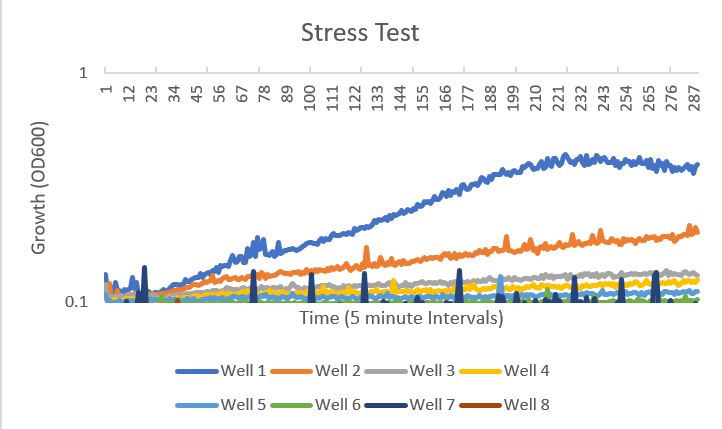Difference between revisions of "UW-Stout/Caffeine SP22"
| Line 38: | Line 38: | ||
|} | |} | ||
| − | [[Image: | + | [[Image:Stresstest1.jpeg]] |
As can be seen in the graph above, Well 1 (our control group) shows the expected growth curve. Every group with a concentration of at least 8mM showed little growth and can be assumed dead. Well 2, at 4mM, shows a reduction in growth but not a visible result for future tests. | As can be seen in the graph above, Well 1 (our control group) shows the expected growth curve. Every group with a concentration of at least 8mM showed little growth and can be assumed dead. Well 2, at 4mM, shows a reduction in growth but not a visible result for future tests. | ||
Latest revision as of 17:39, 3 May 2022
Materials: • Caffeine • Sterile H2O • Wild-Type Yeast Cells • Modified Yeast Cells
Equipment: • Large Test Tube • 1.7 ml Microcentrifuge Tube • 200 ul Pipette • Micro Pipette Tips • Well Plates
Calibration Protocol:
- Create a 32 mM Solution of Caffeine in Sterile H2O.
- Set Well Plate with 50 ul of Wild-Type Yeast Cells and the following concentrations of Caffeine.
| Well 1 | Well 2 | Well 3 | Well 4 | Well 5 | Well 6 | Well 7 | Well 8 | |
| Caffeine Concentration | 0 mM | 4 mM | 8 mM | 12 mM | 16 mM | 20 mM | 28 mM | 32 mM |
As can be seen in the graph above, Well 1 (our control group) shows the expected growth curve. Every group with a concentration of at least 8mM showed little growth and can be assumed dead. Well 2, at 4mM, shows a reduction in growth but not a visible result for future tests.
Knockout Protocol:
